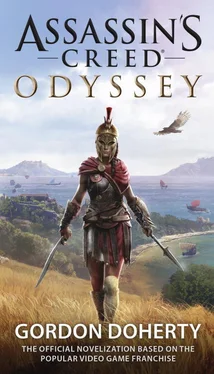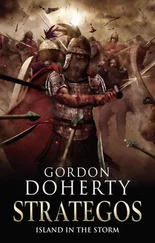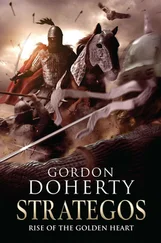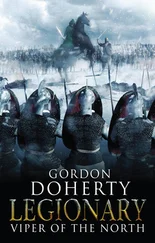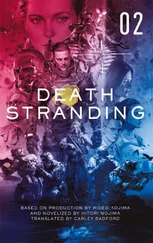Kassandra stopped chewing, and nodded for him to continue.
“He had been shipwrecked in his youth on the shores of Thera, that broken husk of an island, blown apart by a volcano long, long ago. Now that island is barren and bleak—naught but ash and decay. But he managed to survive there for many months eating grubs and molluscs. One night he was awoken by a strange tremor in the ground.”
“The volcano?” Kassandra whispered.
“No, the volcano is long dead like everything else on the isle. It was far stranger than that, Misthios,” Herodotos replied, his eyes growing dark. “As the ground shook, he saw a bright light, glowing in the night, somewhere up in the black heights of the island. It could not have been the fires of a volcano, for the light was pure and golden. He stumbled through the darkness toward the light. Dawn broke before he could reach the spot, and when he got there he found just a plain, black rock face. It took him a few moments to notice the markings.”
“The markings?”
“Carved into the black rock, etched expertly, were strange symbols and sequences. I asked Meliton to describe them to me as best he could, so he drew them out in the dirt.” As he spoke, Herodotos used a finger to trace out geometric shapes in the dirt where they sat. “This,” he said, tapping the dirt, “is the wisdom of Pythagoras.”
A thrill raced up Kassandra’s back.
“Aye,” Herodotos nodded, seeing that she understood the magnitude of it, “the philosopher, the political theorist, the geometrician… one of the most brilliant minds to have graced Hellas. He was one of the few who understood the things that came before man.”
“But they said Pythagoras’s wisdom was lost,” she said, recalling a drunken conversation about the topic in a Kephallonian tavern. “That it died with him, more than sixty years ago.”
“I too thought it was gone.” Herodotos gestured to the spear. “And this etching is a mere fragment. But do you know what it might mean if his wisdom was to be recovered in its entirety? If the people of today could obtain the knowledge to craft things such as your lance, or the artifact you saw in the Cultist cave? And what if I was to tell you that the Cult have been searching for Pythagoras’s lost writings?”
The thrill on Kassandra’s skin turned into a chill shiver. “By all the Gods, it cannot happen.”
“Leonidas said the same. He knew only pieces of it all, but enough to realize that people seeking to harness this ancient knowledge and use it like a sword had to be fought. You are of his line, Kassandra, and that is why you and your family must be saved. In this dark game that so few understand, our world itself is at risk.” He stepped away and walked slowly back toward the Adrestia , motioning for her to stay when she tried to follow. “Take some time, think over what I have said.”
She stayed there for an hour, sitting by the lion and staring down at the bay, wondering how many bones lay underneath the sands. She absently fed Ikaros crumbs of bread, eating a little herself. Thrills of unease and wonder rose within her as she tried to comprehend Herodotos’s words. But damn, Historian, your answers come in the form of a thousand questions, she thought with a tired laugh. “Time to head for Athens, for some real answers,” she sighed, rising.
Thrum… whack!
At once she leapt back and fell into a crouch, staring at the arrow quivering in the earth by her feet. Her eyes combed the heights behind her. Nothing. Then she saw him, staring down at her like a god from a high shelf of rock.
“Deimos?” she croaked. That strange feeling on the boat, the choppy peaks in the night. Her instincts had been right: they had been followed.
He said nothing, simply turning and walking away from the edge and from sight. She stared at the high shelf, then threw herself at the rock face. A moment later and she was halfway up the mountainside, scaling toward the shelf. She hesitated for a moment, before hauling herself up and onto her knees. Deimos was there, waiting for her, back turned. “You followed me all this way?”
“I remember you,” he said. “I was a babe, but I remember you holding me.”
That long-dead flame sparked to life in her heart, flickering within the steely cage. “And I have never forgotten what it was like to hold y—”
“My parents condemned me to be thrown from the mountain,” he cut in, dispassionately. “But it was you… you who pushed me and the old ephor to our deaths. I saw it. The golden artifact showed me.”
“No,” she started. “I tried to save you. You must believe me, Alexios. I had no idea you survi—”
He swung to face her, the sea wind casting his dark locks across his baleful face. “Alexios died that night. Deimos was the name given to me by my real family.”
Kassandra tilted her head back in disdain, the flickering flame in her breastbone dying. “I learned from your wretched cave symposium we’re doing the same thing. Looking for our mother.”
Deimos’s head tilted a little to one side. “If you’re looking for her, that means she abandoned you too.
“Even if we were abandoned, we survived. We can go back to the way things were. We just need to find her.”
“I don’t need her.”
“Your Cultists think differently,” Kassandra said flatly. “Myrrine’s their next target.”
He remained silent for a time. “The Cult wants us because we are special,” he rasped. “But you know that now, don’t you?” He gestured back down toward the lion.
“Then you will not join me to find her?” she said, taking a step back.
“Nor you me?” he countered.
“I will not be part of the… Cult ,” she spat.
A tense silence passed.
“Yet you cannot run from them. You are headed for Athens,” he said at last. “Or so your route would suggest. Well the Cult is already there. When you go, tell Perikles and his elitist scum they’re next.”
He backed away into a small cave opening, vanishing into a cloud of sulfurous steam.
“Alexios?” she called after him.
“Do not follow me, Sister,” his voice rang out from in there. “Be thankful I let you live… for now.”
The air over the harbor of Piraeus was tinged with the stink of sweating sailors and dung, the aroma of baking bread and roasting bream and the heady scent of wine. So many people, Kassandra thought. Voices called out from every direction, dogs barked, gulls screamed, people bartered and chatted, soldiers in blue and white trooped to and from the serried war galleys, while wagons heaped with grain sacks swayed as they rolled down from supply cogs and onto the white-flagged wharf.
She stepped off of the Adrestia and onto the quay, her gaze drawn like one enchanted by the sight of treasure, across the many heads, to the view some two miles inland: the famous city of Athens. A sea of red-tiled roofs, from which the acropolis rose like an island of marble, topped with breathtaking temples and monuments—the like of which she had never seen before, not in Kephallonia, not on her travels and certainly not in Sparta.
The Parthenon shimmered, the silvery stonework and lustrous paintwork blinding in the sunlight. The high, bronze statue of Athena glistened like flame, her face solemn and imperious, spear held like a sentinel.
The way to the city from this harbor was an odd thing: a narrow promenade that stretched for all of those two miles, like an arm reaching out from the city proper to clutch onto and keep hold of this nearest piece of coastland and its wharf. Stonemasons and slaves swarmed like ants, settling the final blocks into place atop strange walls lining either side of the promenade, their chisels tapping in an incessant rhythm.
Читать дальше
